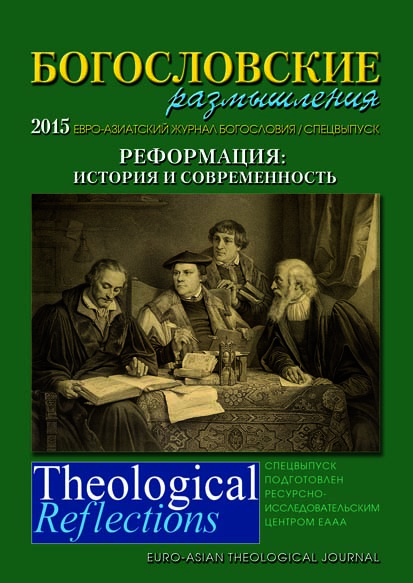The Faith of Luther and Pentecostalism
Keywords:
Luther, Pentecostalism, Protestantism in EuropeAbstract
We do not create God by our theology: it is because we Y Y actually encounter God that we try to understand what has happened and attempt to explain it theologically. We should also keep in mind that theology, which is usually expressed in statements, propositions, and creeds differs from spirituality, which is challenging contemporary scholarship by seeking a proper interdisciplinary approach to its sphere of study. Faith is not just a matter of understanding God; rather, it is experiencing the real presence of the Holy One. The American Lutheran theologian Grace Adolphsen Brame points out the existence of two kinds offaith that can be defined as the "faith of the head" (belie for knowing about God) and the "faith of the heart" (trust or knowing God personally) The value of the charismatic experience in interpreting the texts oflate antiquity is receiving more and more recognition, evidenced by the recent publications of the "Religious Experience in Early Judaism and Early Christianity" section of the Society of Biblical Literature (2008, 2012). The arowina interest in "enthusiaso-Chistory. This paper will argue that five-hundred years after the Reformation closeness to God for our secularized society is infinitely greater than mere creeds and philo sophical proofs of God's existence. How does Pentecostalism relate to Protestantism in Europe? Being brought up in the Lutheran tradition, I chose for this study the faith of Martin Luther (1483-1546), which is expressed in his works, and in his at tempt at the reformation of Church institutions through a deeper spiritual life and in his understanding of the Holy Spirit. Finally, I will try to prove that this faith was inherited by Pentecostalism.
Downloads
How to Cite
Issue
Section
License
Copyright (c) 2020 Olga ZAPROMETOVA

This work is licensed under a Creative Commons Attribution-NonCommercial 4.0 International License.
All articles published in the Journal are distributed under a Creative Commons Attribution-NonCommercial 4.0 International License
By submitting an article for publication in Theological Reflections: Eastern European Journal of Theology the author grants the editors the right to publish the article and distribute it in electronic and print form.
The author reserves all copyrights and the right to use the materials of the article in whole or in part for educational purposes, to write his own dissertations, to prepare abstracts, conference reports, oral presentations, etc., as well as post electronic copies of articles (including the final electronic version downloaded from the journal’s official website) on non-commercial web-resources without the consent of the editorial board and founders.



